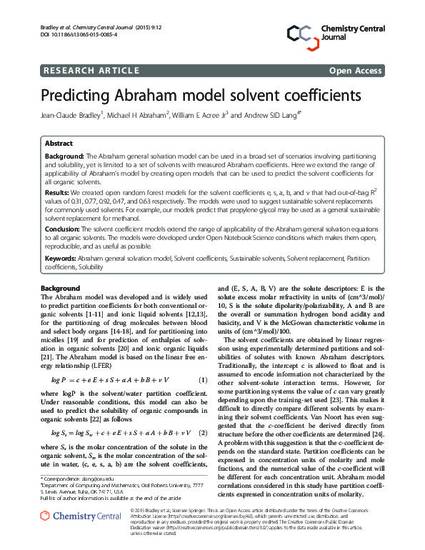
Article
Predicting Abraham model solvent coefficients
Chemistry Central Journal
(2015)
Abstract
Background: The Abraham general solvation model can be used in a broad set of scenarios involving partitioning
and solubility, yet is limited to a set of solvents with measured Abraham coefficients. Here we extend the range of
applicability of Abraham’s model by creating open models that can be used to predict the solvent coefficients for
all organic solvents.
Results: We created open random forest models for the solvent coefficients e, s, a, b, and v that had out-of-bag R2 values of 0.31, 0.77, 0.92, 0.47, and 0.63 respectively. The models were used to suggest sustainable solvent replacements for commonly used solvents. For example, our models predict that propylene glycol may be used as a general sustainable solvent replacement for methanol.
Conclusion: The solvent coefficient models extend the range of applicability of the Abraham general solvation equations to all organic solvents. The models were developed under Open Notebook Science conditions which makes them open, reproducible, and as useful as possible.
Keywords
- Abraham general solvation model,
- Solvent coefficients,
- Sustainable solvents,
- Solvent replacement,
- Partition coefficients,
- Solubility
Disciplines
Publication Date
March 22, 2015
DOI
10.1186/s13065-015-0085-4
Citation Information
Andrew Lang, Jean-Claude Bradley, Michael H. Abraham and William E. Acree. "Predicting Abraham model solvent coefficients" Chemistry Central Journal Vol. 9 Iss. 12 (2015) Available at: http://works.bepress.com/andrew-sid-lang/24/
Creative Commons license

This work is licensed under a Creative Commons CC_BY-SA International License.
